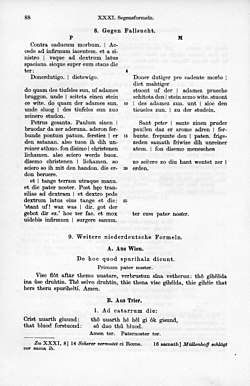Contra caducum morbum
Contra caducum morbum or Pro cadente morbo , against the falling sickness ' is a late Old High magic or blessing for epileptic seizures.
Saying
The saying is in understanding the context of antique and late antique notions that the epilepsy , epilepsy by spirits or demons caused and the "victim" to the possessed made. In its formal structure , the Contra caducum morbum shows a useful introductory formulation for an exorcism with a double command to invoke stant uf waz dir. got the bid you ez .
The question whether the saying reflects pre-Christian pagan and popular religious ideas and traditions is controversial or unclear . The phrase Doner dutiger .. diet mahtiger (Münchner Hs.) Attracted particular attention . Some researchers see here an old traditional rod-rhyming form of an appeal to the Germanic god Donar present (recent publications: Beck, Holzmann, Pogliani). Pogliani transmits the phrases (M, P) as:
“Gracious and everlasting Donar! Roaring Donar, eternal sound! "
The manuscripts
The saying has come down to us in two manuscripts.
- (Pro cadente morbo) The so-called St. Emmeram manuscript, today Munich , Bayerische Staatsbibliothek , Clm 14763, fol. 88 v (Sigle M) from the 11th century .
- (Contra caducum morbum) From the 12th century comes the manuscript in Paris (Sigle P) Bibliothèque nationale de France , Cod. Nouv. acqu. lat. 229, fol. 9 v , line 11-23.
literature
expenditure
- Wilhelm Braune, Ernst Ebbinghaus: Old High German Reading Book , 17th edition, Niemeyer, Tübingen 1994, p. 88.
- Elias von Steinmeyer : The smaller old high German language monuments , Berlin 1916, pp. 380–383.
Research literature
- Georg Baesecke : Contra caducum morbum . In: Contributions to the history of German language and literature 62 (1938) pp. 456–460
- Wolfgang Beck : Donerdutigo. To the historiola of the magic spell Contra Caducum Morbum. In: Amsterdam Contributions to Older German Studies 67 (2011), pp. 91-104
- Theodor von Grienberger : Old High German Text Explanations I, 1. Contra caducum morbum . In: Contributions to the history of the German language and literature 45 (1921), pp. 212–216
- Theodor von Grienberger: The old German healing saying against falling addiction . In: Journal for German Antiquity and German Literature 42 (1898), pp. 186–193.
- Verena Holzmann: "I woo you worm and wyrmin ...". Forms and types of old German spells and blessings. (= Viennese works on Germanic antiquity and philology 36), Bern a. a. 2001, p. 192 (No. 127).
- JA Huisman: Contra caducum morbum. To the old high German saying against epilepsy . In: Amsterdam Contributions to Older German Studies 17 (1982), pp. 39–50.
- Annarita Pogliani: Linked by an unequal fate. The two versions of the old German epilepsy blessing. In: Journal for German Antiquity and German Literature 138 (2009), pp. 296–311.
- Hans-Hugo Steinhoff: Contra caducum morbum. In: Author's Lexicon - The German Literature of the Middle Ages , 2nd ed., Vol. 2, de Gruyter, Berlin / New York 1980. Col. 8 f.
- Wolfgang Achnitz (Hrsg.): German Literature Lexicon. The Middle Ages , Volume 1 The spiritual literature from the beginning to the beginning of the 14th century , De Gruyter, Berlin / New York 2011, ISBN 978-3-598-24991-4 , Sp. 209f.
Web links
- Contra caducum morbum in the manuscript census of the Paderborn Repertory
